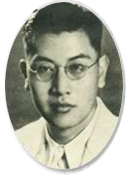Home>Victoria Prison>A poet in jail?
A poet in jail?
 Dai Wangshu
Dai Wangshu
Another renowned inmate of the Victoria Prison was the poet Dai Wangshu (1905-1950). Born under the name Dai Chaocai in Hangzhou, Dai studied law in Zhendan University of Shanghai. At 23 with the publishing of his new poem Yu Hang Dai ascended to fame. In 1938 he fled the occupied Shanghai and came to Hong Kong with his wife and daughter. He moved into a residence at Pok Fu Lam Road and later joined Sing Tao Daily as the Editor-in-chief of the literary supplement. With the war against Japan raging at the time, Dai turned the supplement into a forum of anti-Japanese literary works. The essays he published were also closely related to anti-Japanese themes. He became the forerunner to the Anti-Japanese literary genre.
In December 1941 Hong Kong fell into Japanese hands. The Japanese soon arrest Dai Wangshu for “engaging in Anti-Japanese activities”. Dai was imprisoned in Victoria Prison during which he suffered greatly both in body and mind from the tortures inflicted on him. But, with an undefeatable spirit, during his imprisonment Dai wrote the well-known new poem titled Written on the Wall in Prison: “Were I to die here/ My friends/ Grief not/ For I will live forever in your heart.” It was a display of great courage and fearlessness in the face of death.
After being imprisoned for a few months in Victoria Prison, with the help of his friend Ye Lingfeng Dai was released on bail. Later he wrote With My Broken Palm: “With my broken palm I fumbled about this great land/ This corner is naught but ashes, blood and soil/ This lake, where my hometown should be…” It was an emotional display of his love of his besieged country.
Later, Dai stayed in Hong Kong and engaged in culture-related work. After the War against Japan ended in victory, he returned to Shanghai in the following year. In 1948 he returned to Hong Kong and continued to earn a living with his writing. In February 1949 after the liberation of Beijing, he left Hong Kong – where he stayed 8 years – and headed for Beijing. Within a year of his arrival, however, he passed away from asthma at the age of 45.
<
Back to Previous Page

Hong Kong Memory.All Rights Reserved©2014
 Dai Wangshu
Dai Wangshu